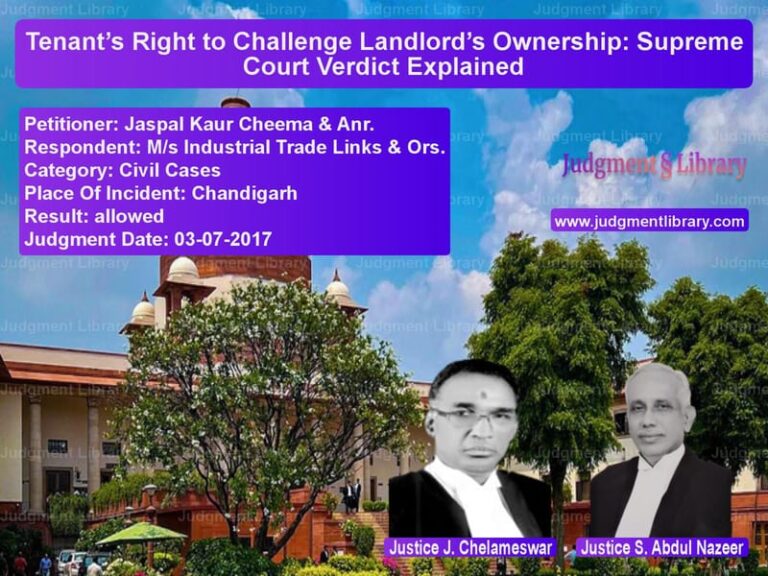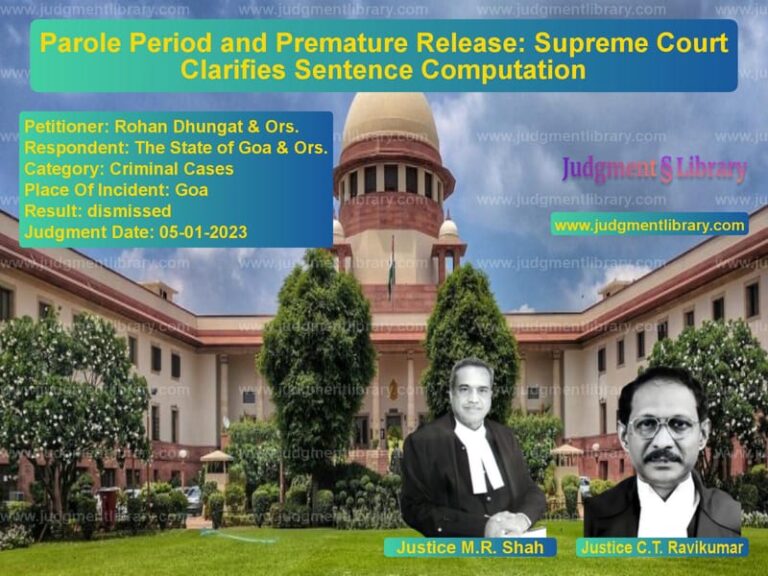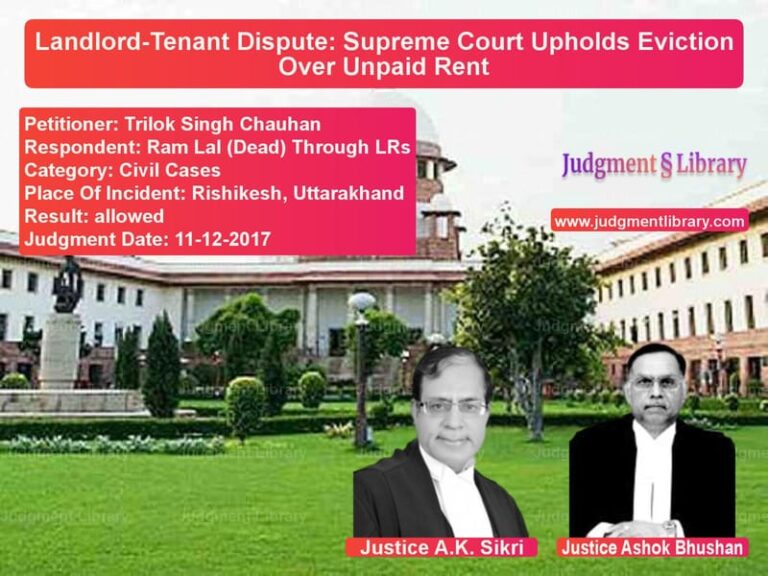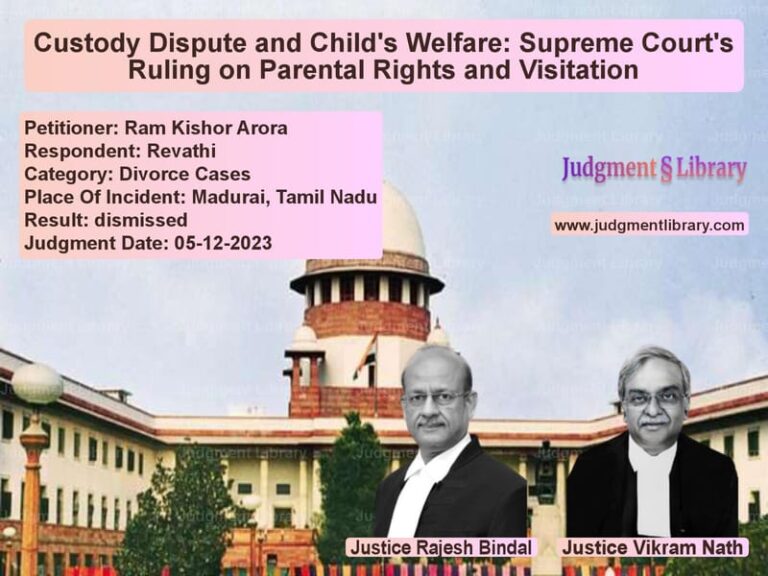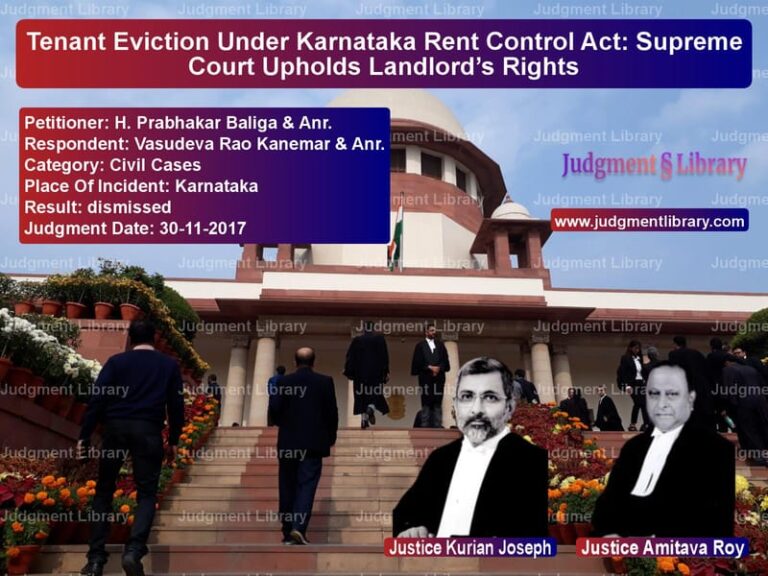Conditional Leave to Defend in Summary Suit: Supreme Court Overrules High Court Decision
The case of Sudin Dilip Talaulikar v. Polycab Wires Pvt. Ltd. & Others revolves around a dispute in a summary suit under Order XXXVII of the Code of Civil Procedure, 1908. The Supreme Court had to determine whether the appellant should be granted unconditional leave to defend or whether the High Court’s condition of depositing Rs. 30,00,000/- to contest the suit was justified. The Court’s ruling provides clarity on the principles governing conditional leave to defend in commercial litigation.
Background of the Case
The dispute originated from a commercial transaction between the appellant and the respondent, Polycab Wires Pvt. Ltd. The respondent supplied electrical cables and wires to the appellant between May 9, 2010, and June 3, 2011. The respondent claimed outstanding dues amounting to Rs. 34,24,633/- for these supplies.
Key Facts Leading to the Lawsuit
- The respondent alleged that two cheques issued by the appellant on March 1, 2014 were dishonored.
- A notice under Section 138 of the Negotiable Instruments Act was issued after the cheques bounced.
- The respondent initially filed a criminal prosecution under Section 138 but later withdrew it unconditionally.
- Subsequently, the respondent filed a summary suit under Order XXXVII CPC on November 24, 2015, claiming a total amount of Rs. 64,18,609/- (including interest).
Arguments of the Parties
Petitioner’s (Appellant’s) Argument
- The appellant contended that the condition imposed by the High Court to deposit Rs. 30,00,000/- was unjustified.
- The withdrawal of the Section 138 prosecution was unconditional, proving that there were no outstanding dues.
- The appellant had already paid all legitimate dues, returned defective goods, and settled the balance of Rs. 5,00,000/-.
- There was no fresh transaction between the parties after 2011, making the alleged dues in 2014 suspicious.
- The cheques were tampered with, as different inks were used for the signatures and contents.
Respondent’s (Polycab Wires Pvt. Ltd.) Argument
- The summary suit was validly filed for recovery of outstanding dues.
- The withdrawal of the criminal case did not bar the maintainability of the civil summary suit.
- The appellant had not provided documentary evidence proving that the dues were settled.
- The existence of a prior commercial relationship justified the summary suit.
Legal Issues Considered by the Supreme Court
The Court had to decide whether the conditional leave to defend granted by the High Court was justified. The legal framework governing summary suits under Order XXXVII of CPC was examined.
Understanding Summary Suits Under Order XXXVII CPC
Order XXXVII provides a fast-track litigation process for recovery of money based on written contracts, dishonored cheques, and other financial instruments. Under Rule 3(5) of Order XXXVII:
- If the defendant has a substantial defense, unconditional leave to defend must be granted.
- If the defendant raises triable issues, the Court may impose conditions before granting leave.
- If the defense is frivolous or vexatious, leave to defend may be refused.
Supreme Court’s Key Observations
“In a summary suit, if the defendant discloses such facts of a prima facie fair and reasonable defense, the court may grant unconditional leave to defend.”
The Court relied on the principles laid down in IDBI Trusteeship Services Ltd. v. Hubtown Ltd., 2017 (1) SCC 568:
- Where the defendant raises a substantial defense, unconditional leave must be granted.
- Where there is a fair or reasonable defense, though not a good defense, unconditional leave is granted.
- If the defense is plausible but improbable, the Court may impose conditions.
- If no substantial defense is raised, leave to defend should be refused.
Supreme Court’s Ruling
The Court noted several inconsistencies in the respondent’s claims:
- The respondent withdrew the criminal prosecution unconditionally after being asked to produce documents.
- The alleged dues were from 2011, but the cheques were dated 2014, raising doubts about the legitimacy of the claim.
- The appellant provided a plausible defense that he had already settled all dues.
Thus, the Court ruled:
“The defense raised by the appellant was certainly not a sham or a moonshine, much less frivolous or vexatious. The appellant had raised a substantial defense and genuine triable issues.”
The Court set aside the High Court’s order and granted the appellant unconditional leave to defend.
Significance of the Judgment
- Commercial Litigation: The judgment clarifies that the existence of a prior commercial relationship alone does not justify imposing conditions in a summary suit.
- Burden of Proof: The plaintiff (respondent) must prove that dues exist rather than the defendant having to disprove the claim.
- Negotiable Instruments Act vs. Summary Suit: Withdrawal of a Section 138 case can impact the credibility of the plaintiff’s claim in a summary suit.
- Judicial Discretion: Courts must carefully balance speedy resolution with fairness when imposing conditions for leave to defend.
Conclusion
The Supreme Court’s ruling in Sudin Dilip Talaulikar v. Polycab Wires Pvt. Ltd. sets a vital precedent on the application of conditional leave to defend in summary suits. The Court reaffirmed that mere existence of past business transactions does not imply outstanding dues. The ruling ensures that defendants in commercial cases are not burdened with unfair conditions without sufficient evidence from the plaintiff.
Petitioner Name: Sudin Dilip Talaulikar.Respondent Name: Polycab Wires Pvt. Ltd. and Others.Judgment By: Justice Ashok Bhushan, Justice Navin Sinha.Place Of Incident: India.Judgment Date: 15-07-2019.
Don’t miss out on the full details! Download the complete judgment in PDF format below and gain valuable insights instantly!
Download Judgment: Sudin Dilip Talaulik vs Polycab Wires Pvt. L Supreme Court of India Judgment Dated 15-07-2019.pdf
Direct Downlaod Judgment: Direct downlaod this Judgment
See all petitions in Contract Disputes
See all petitions in Debt Recovery
See all petitions in Judgment by Ashok Bhushan
See all petitions in Judgment by Navin Sinha
See all petitions in allowed
See all petitions in Quashed
See all petitions in supreme court of India judgments July 2019
See all petitions in 2019 judgments
See all posts in Civil Cases Category
See all allowed petitions in Civil Cases Category
See all Dismissed petitions in Civil Cases Category
See all partially allowed petitions in Civil Cases Category


